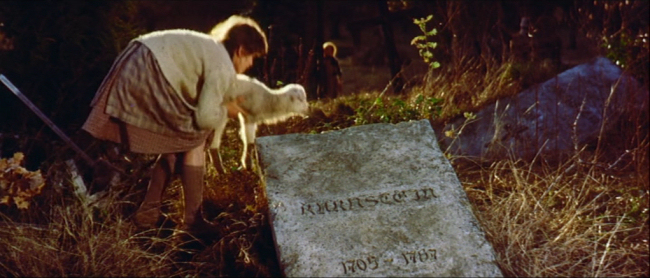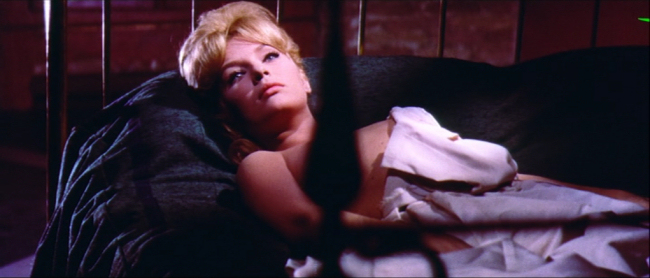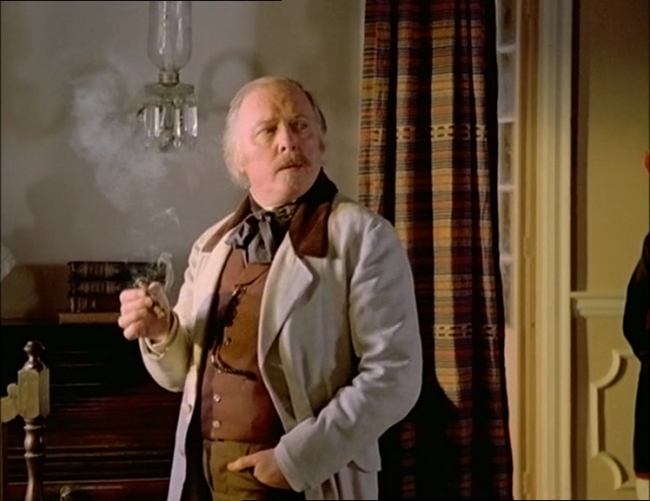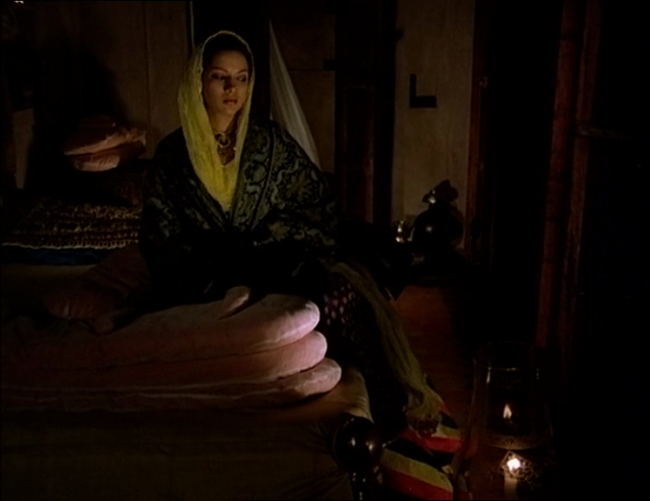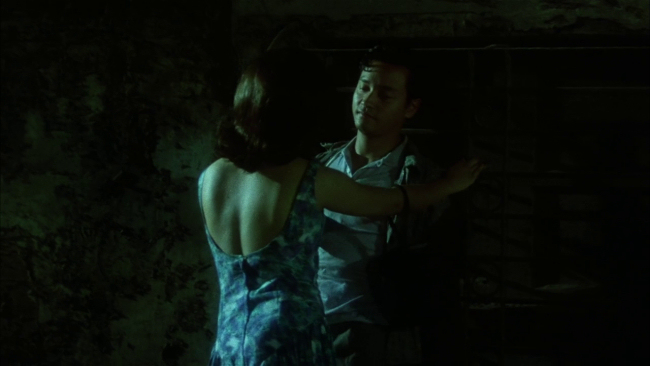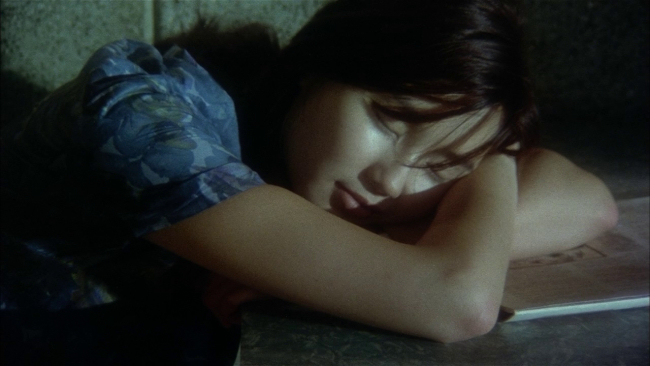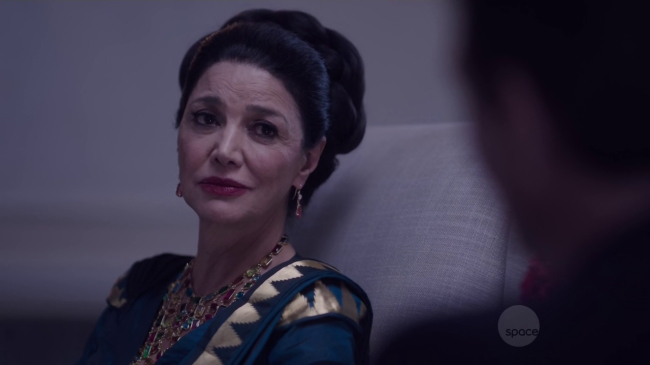
There were some really lovely visuals in last night's two part season finale of Star Wars: Rebels, "Zero Hour", and I appreciated references to The Empire Strikes Back, Jedi Knight, and Lord of the Rings. Lars Mikkelsen continues to impress as Grand Admiral Thrawn, Vanessa Marshall is solid as always as Hera, and Tom Baker loomed large in a very satisfying way. It's a pity the teleplay was a complete mess though I can't entirely fault writers Steven Melching, Henry Gilroy, and Matt Michnovetz. The problems that led to "Zero Hour" being such a featherweight are part of the foundations of the series as a whole and Disney's stewardship of Star Wars in general.
Spoilers after the screenshot

The episode began with a cool reference to the Jedi Knight video games--Agent Kallus (David Oyelowo) uses a mouse droid in a service duct to spy on Trawn's briefing. This comes from a level in the 2002 video game Jedi Outcast which was in turn based on a user made mod to 1997's Jedi Knight. You see, Paramount? While you're busy suing Star Trek fan films, LucasArts found a way to respond to fan creativity where everyone won and in a way that's still paying dividends to-day. I sense the hand of Gary Whitta in this.

Back at Chopper Base, Ezra (Taylor Gray) seems to've become Oliver Twist, humbly talking to Kanan (Freddie Prinze Jr.) about all the wonderful things other people do. I don't think Ezra's meant to come off like he's fishing like hell for complements, but he does, and Kanan inexplicably is happy to shower them on the kid with the whiny voice. Ezra thanks Kanan for teaching him how to be a good person, which we really haven't seen demonstrated. I get the sense there's an outline from early on that said this was supposed to be clear by this point. In reality, Ezra's been all over the place in a way that feels like a lot of conflict and indecision behind the scenes--in season 2, he became the nature child who was friend to all animals, then he lost that as he seemed to be going to the Dark Side, then he lost his flirtation with the Dark Side for no apparent reason, giving moralising lectures to Saw Gerrera, and now he seems to be in total character limbo. Considering there's a whole story group designed to keep everything in Star Wars canon consistent, the story in Rebels feels surprisingly scattershot. Or maybe that's the reason. In Star Wars parlance, the more they tighten their grip, the more plot points slip through their fingers.
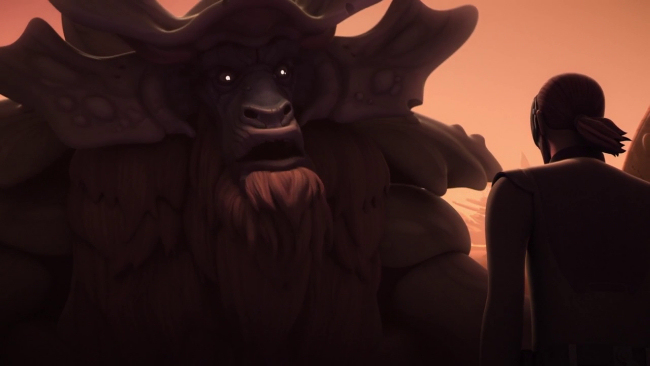
The Bendu is a good example. Kanan doesn't sound too high minded when his strategy for getting the Bendu involved is to call him a coward. Is Disney's message here to say, "Bullying is wrong. Unless you need to"? It's weird that this all wise being is so easily manipulated, but then, it doesn't make much sense for Kanan to have to beg for his help when the Bendu has already gone out of his way to help Kanan and Ezra in the past.
It seems like the show was paying homage to Lord of the Rings here as it felt very much like Merry and Pippin trying to get the Ents involved in the war in Peter Jackson's adaptation of The Two Towers. Of course, in the book, Merry and Pippin witness the Ents decide on their own to attack Isengard, but due to the modern mania for agency in protagonists, Jackson and crew had to make the Ents' decision something Merry and/or Pippin actually made happen in a more active way than just providing intel. Similarly, to give Kanan an active role in the story, we can't just have the Bendu decide on his own to help the Rebels, despite the fact that this would have made more sense, if for no other reason than the fact that an assault on the Rebel base is an assault on the Bendu's world. But at least Jackson and his writers found a somewhat clever way of getting Pippin to trick the Ents into beholding the destruction Saruman was causing (though they ought to've known without Pippin's help that the forests were being destroyed). Having Kanan just resort to calling the Bendu a coward undercuts the moral authority the show repeatedly fails to establish in Kanan and it undercuts the Bendu as a character.

But, okay, Bendu turning into a storm was pretty cool and Tom Baker's performance coupled with the cgi wind and lightning really was like watching a Greek god rain hellfire. That is until the Imperial forces shot him down. With lasers.

Rain, rain, go away, or I'll shoot at you.
The Bendu goes out like Ahsoka--ambiguously because the writers can't or won't make a decision. It seems silly for the Bendu to be so easily taken down by blasters. But did the Bendu vanish because he was immune all along or was this like a Jedi Force Ghost death? Who knows. I suppose it is slightly better than Ahsoka's death/not death because at least it makes sense that the Bendu doesn't meet up with the rest of the protagonists afterwards if he is alive.

I like the fact that Thrawn was only stopped because of the Bendu. Thrawn came off as pretty effective even if going for a fist fight with Kallus and leading the ground assault seems more like Vader's style. Finally the Empire gets sort of a win on Rebels. Sort of. Ships were destroyed. The Rebels lost Commander Sato (Keone Young), though he took out an Imperial ship in the process. Just wait for Mart's revenge! You remember Mart, right?

Poor doddering old General Dodonna (Michael Bell) who refers to a planned Rebel attack as their first blow against the Empire. Apparently no-one's told him the Rebels destroy a capital ship every other week. Maybe Dodonna wrote the Episode IV opening crawl.
Thrawn pin-points the location of the Rebel Base because a planet that does not appear on Imperial charts is one that shows up in art from the region. Why would the Empire not have this planet on their charts? Maybe it simply hadn't been discovered by Imperial or Republic explorers, or was this supposed to be the planet Ezra deleted from Thrawn's computer a few episodes back? Of course by now Thrawn would have seen charts on other computers and the fact that one had been deleted would be suspicious, but that would be too obvious so there needed to be another explanation, so what was the point of Ezra deleting the planet . . . Wait, if the planet weren't on Imperial charts, why would it be on Thrawn's chart to begin with?
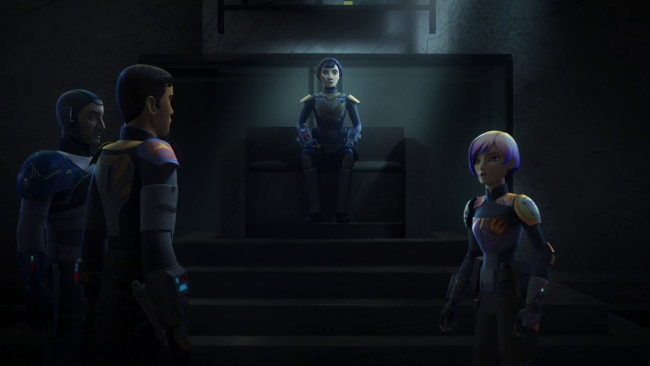
I guess Ezra did get a useful ship back on Tatooine which may or may not have been Maul's ship--if it was, why was Maul roaming alone in the desert? If it wasn't, how did Ezra get it--well, if it was, how did Ezra find it if Maul couldn't?
Anyway, it was a lucky find as it allowed Ezra to heroically run away and ask Sabine for help and somehow bring her and ships back in time to actually be helpful because I guess the Imperial ships have to do a lot of prep work before they blow up a sitting duck. Anyway, sounds like next season they'll be on Yavin which should be fun.

Oh, I wanted to mention Hera called Kanan "Love" in the episode, hinting at the relationship that Dares Not Speak It's Name for No Apparent Reason. This is a reflection of what seems to be Disney's edict for shows and movies not to include clear romantic relationships, despite the fact that Han and Leia's relationship was one of the highlights of the original trilogy. I know Anakin and Padme were pretty infamously awkward but is that really a good reason to stay away from romance forever? On the other hand, Hera can do so much better than Kanan.
Twitter Sonnet #976
A burning ear can thwart a list'ning can.
In single clods the rain was dropped too late.
Too many eyes were caught to see the man.
In ev'ry knot the sides of steps'll take.
Proceeding up the stairs, a rope was tricked.
A simple sod was given cream and ice.
To move by action movie flips was thick.
You know the lying car exploded twice.
A diaper carries vital shit to space.
Concealed in Brando's crystal pod, it sleeps.
An eating, drinking, autopilot ace.
In tupperware the salted pastry keeps.
Between decisions sugar scones'll rot.
The safest brain is all a bleeding clot.













